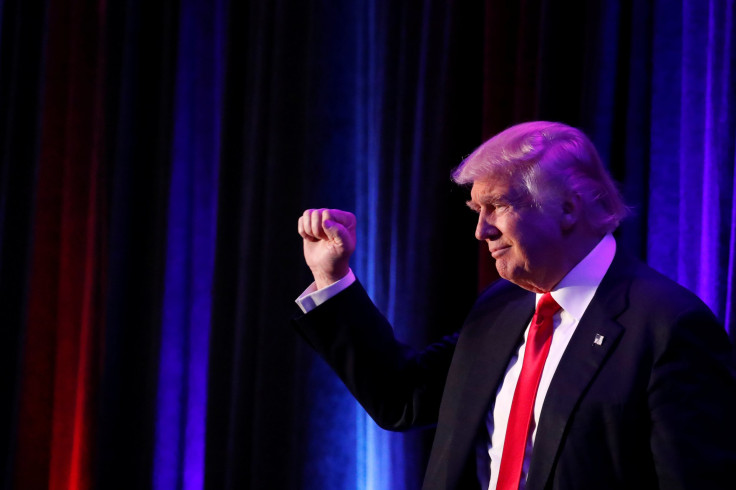Why Did Donald Trump Win The Election? Pollsters, Editors, Officials Point To Comey, Clinton Appeal, Media And More

Renowned statistician Nate Silver pegged the likelihood of a Hillary Clinton victory at 72 percent as of late Tuesday morning. The New York Times’ election model pegged the possibility of her election at 85 percent as of Nov. 8, and Reuters/Ipsos States of the Nation poll released Tuesday gave her a 90 percent chance.
So what happened?
Editors, pollsters and officials pointed fingers in a multitude of directions.
According to pollster Geoff Garin, who served as co-chief strategist for Clinton’s 2008 campaign, surveys overwhelmingly failed to take into account the voting behaviors of non-college-educated whites, who predominantly vote for Donald Trump.
“There was too great a belief that demographics are destiny, and that demographics would lead to a certain outcome,” Garin told Politico, adding that the actual results were “much different.”
The Guardian’s data editor Mona Chalabi, who previously worked for Silver’s data site FiveThirtyEight.com, wrote in an editorial early Wednesday that she has long “been concerned by how much faith the public has placed in polling,” and cautioned that social science is not empirically predictable in the way natural sciences, like meteorology, can be.
“People are different from planets—they can change their minds, they can decide to not share their opinions or they can flat out lie,” she wrote, drawing parallels to the U.K.’s surprise vote to leave the European Union in June. “And that’s before you even get to some of the statistical issues that make polling inaccurate.”
NPR politics editor Domenico Montanaro highlighted a significant drop in turnout as the key reason, with 6.8 million less people voting for the Democratic nominee compared to 2012, and just 1.9 fewer people voting for the Republican.
Turnout
— Domenico Montanaro (@DomenicoNPR) November 9, 2016
2012 Obama: 65.9m
2016 Clinton: 59.1m = -6.8m
2012 Romney: 60.9m
2016 Trump: 59m = -1.9m
You tell me what happened
Making matters worse for Clinton was the way certain groups voted, as CBS’s Stanley Feldman and Melissa Herrmann noted. The gender divide between the two candidates was stark, and Clinton won only 41 percent of men’s votes, compared to Barack Obama’s 45 percent in 2012 and Trump’s 53 percent this year, according to CBS News exit polls. But while Clinton won 54 percent of women’s votes compared to Trump’s 42 percent, she faltered among white voters, with 53 percent of white women choosing Trump and 43 percent voting for Clinton, and a whopping 65 percent of white males choosing Trump, compared to just 31 percent who voted for Clinton.
A Quartz political reporter put it more succinctly: “White Americans heard Trump’s voice, not Clinton’s, and came out to make him president.”
Then there’s another big reason—the factor that allowed his voice to be heard, that gave the Republican candidate $5 billion in free advertising. Indeed, many are blaming the media for Trump’s success, including members of the media themselves.
(2) Trump was handed a billion dollars in free media because he was entertaining and drew eyeballs. Meanwhile, the media got clowned bigtime
— Tony Norman (@TonyNormanPG) November 9, 2016
For Vox editor-in-chief Ezra Klein, it was not the media establishment but the accessibility of the media that more easily led to a cult-like following for an unconventional, outsize personality like Trump.
“Parties used to drive media attention by signaling to reporters which candidates to take seriously,” Klein wrote in an editorial on Monday. “But that process… has been democratized—social media makes it easy to communicate with supporters directly and made it more valuable for audience-hungry media outlets to cover the candidates with intense fan bases that send stories viral across Facebook or Reddit. That, again, favors exciting outsiders with enthusiastic supporters over vetted establishment grinds.”
Many Democratic columnists and analysts had a different, more specific culprit in mind.
This close election brought to you by James Comey #ElectionNight
— Dr. Jason Johnson (@DrJasonJohnson) November 9, 2016
If Trump wins, I suspect he owes a big "thank you" to Jim Comey
— Nicholas Kristof (@NickKristof) November 9, 2016
I wrote this a week ago. Could be the story. https://t.co/hLu2cIiSia
— Jonathan Chait (@jonathanchait) November 9, 2016
House minority leader Nancy Pelosi called Federal Bureau of Investigation (FBI) director James Comey’s Sunday decision to publicize his reopening of the investigation into Clinton’s private email server—which he concluded by upholding his previous conclusion that Clinton had done nothing illegal—a “Molotov cocktail,” with the election just days away. Following Comey’s announcement, Clinton’s lead over Trump grew slimmer.
In an Oct. 29 story by New Yorker staff writer Jane Mayer, anonymous Justice Department officials railed against the unprecedented decision to make the inquiry public, pointing to former attorney general Janet Reno’s decision to “shut down” the prosecution of a politically sensitive individual ahead of an election.
“You don’t do this,” one Justice Department official told Mayer, “because it impugns the integrity and reputation of the candidate, even though there’s no finding by a court, or in this instance even an indictment.”
© Copyright IBTimes 2025. All rights reserved.






















